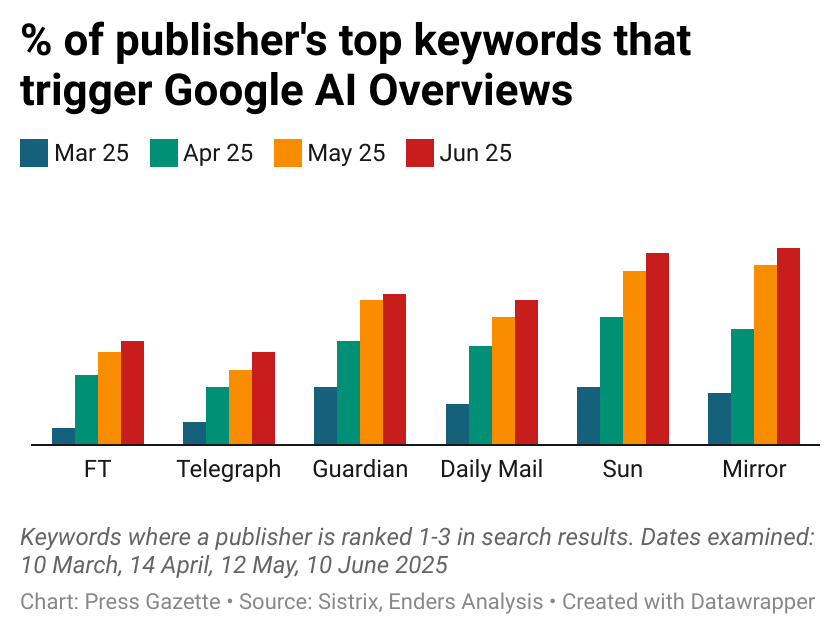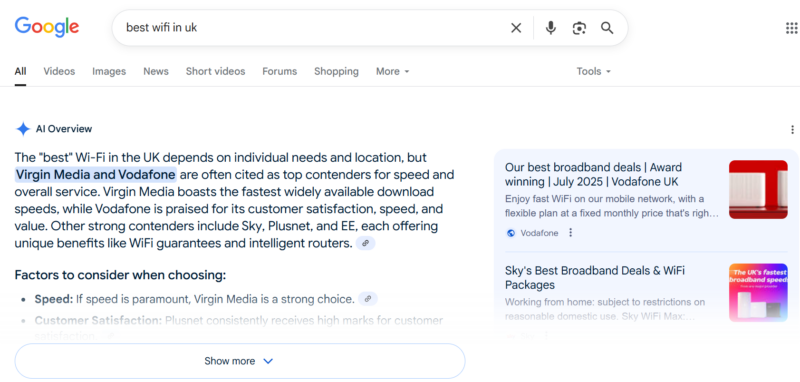
The visibility of some of the UK’s biggest national news publishers in Google search results has dropped by up to 80% compared to 2019, according to new analysis.
A report by Enders Analysis looking at Sistrix data for the Financial Times, The Telegraph, Daily Mail, The Sun, Mirror and The Guardian found “some correlation” between the decline in visibility and the rollout of Google’s AI Overviews summarising information at the top of search results.
The report said that overall publishers have become “less visible” in Google search results with the trend accelerating “sharply” since late April this year despite major news events like the death of Pope Francis and Donald Trump’s tariffs causing trade tensions with China, stories that “would typically drive significant search traffic”.
Google started rolling out its AI Overviews summaries at the top of search results in the UK in August last year. It has now launched a new search experience, AI Mode, which is in a separate tab and gives even more information in one answer.
The Enders Analysis report, published in July, said Sistrix data shows the Mirror’s visibility in search results has shrunk by 80% while the Mail is less than half as visible.
The Sistrix Visibility Index looks at how prominently a domain appears in Google search results, looking at the top 100 results for each of 100,000 tracked keywords.
Compared to January 2022, the report said, the Mirror is at 20% of the visibility level it had then. The Sun is at 33% of its 2022 level and the Daily Mail is at 47%.
The most resilient in terms of visibility, it went on, was The Telegraph (at 95% of January 2022 levels) followed by The Guardian (72%) and the Financial Times (71%).
The Enders report said: “Individual strategy changes (e.g. a publisher cutting SEO investment or paywalling content) can contribute to visibility decline, but the scale and timing of decline in publishers’ visibility across the board strongly points to changes in Google’s systems – not publisher intent – as the main driver.”
The report said causation from Google’s AI features is “difficult to prove” but that “the correlation is notable: as Google has started to answer more queries directly, traditional publisher links seem to appear further down the page”.
Several of Google’s major algorithm updates in recent years have coincided with big drops in visibility to publishers even before the arrival of AI Overviews, with 33 major publishers seeing double-digit declines from the March 2024 update.
Likelihood of a publisher’s keywords triggering an AI Overview up by 3.5x in three months
The report also found that the likelihood of a publisher’s keywords triggering an AI Overview has increased by three-and-a-half times since March.
The Financial Times and The Telegraph had the smallest proportion of keywords triggering an AI Overview (18% and 16% respectively in June, up from 3% and 4% in March). At the other end of the scale was the Mirror (34% of keywords, up from 9% in March) and The Sun (33%, up from 10%).
This is likely because, the report found, a “significant number of long-tail entertainment and celebrity queries” trigger AI Overviews. “While these may not generate the highest clicks individually, their combined search volume and reach is considerable.
“In contrast, the highest-click queries (typically navigational or strongly branded) remain relatively insulated.
“Nonetheless, some of the Mirror’s most valuable traffic-driving queries – especially as the Mirror operates with a volume strategy – do indeed appear at risk of disruption from an increasing AI presence in search.”
Meanwhile many of the keywords that trigger an AI Overview for The Telegraph are informational recommendation searches – for example “best place to stay in…” or “best wifi in the UK”. The report noted this “could potentially pressure affiliate revenues in the longer-term”.
When Press Gazette searched “best wifi in uk” on Wednesday 30 July, an AI Overview came up sharing information about various providers. Under the AI summary, Google provided a sponsored link and several “people also ask” questions. After that – more than one full page scroll on desktop – the first organic search result was to The Telegraph sharing the best providers as “recommended by readers”.

Commercial impact ‘modest’ in short term but threat to discoverability
For now, however, Enders found that the commercial impact is “likely to be modest. The Sun and Mirror are the most exposed to potential dips in organic traffic (and by extension, advertising revenue), but we estimate percentage impact will be in the low single digits.
“That is because the overall impact is shaped by three compounding factors: the share of traffic that comes from organic search; the proportion of keywords that now trigger an AI Overview; and the effect of that AI Overview on clickthrough rate (i.e. a percentage of a percentage of a percentage).”
The bigger threat facing publishers was said to be a hit to their discoverability “and the shrinkage of the top of the funnel”, the report said, putting for example the growth of potential subscribers under threat.
Enders noted that although the FT had the second-highest proportion of direct traffic in the national newspaper sample, it still saw a 21% drop in traffic in mid-April.
“Tabloids such as the Sun and Mirror face greater exposure: lower direct traffic insulation, higher AI Overview keyword coverage, and reliance on high-volume advertising models make them particularly vulnerable.”
The report also noted that other factors in the changing online environment may be affecting traffic, such as users bypassing traditional search entirely to look for answers in the newer AI platforms like ChatGPT and Perplexity. While the number of users to these platforms remains much smaller than Google, their search queries are growing rapidly.
Email pged@pressgazette.co.uk to point out mistakes, provide story tips or send in a letter for publication on our "Letters Page" blog
